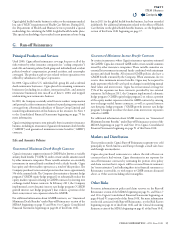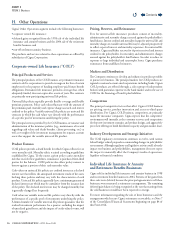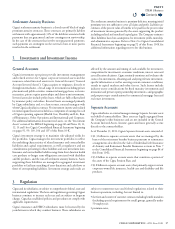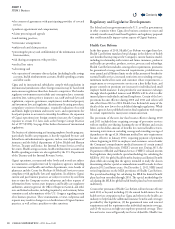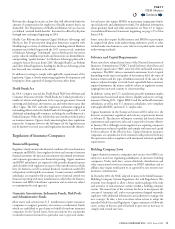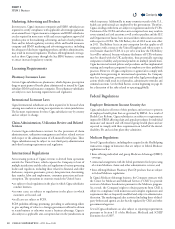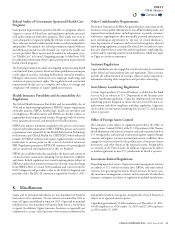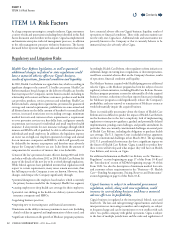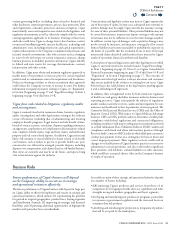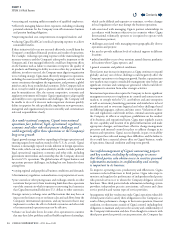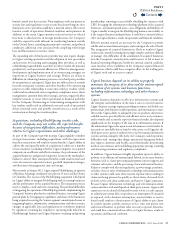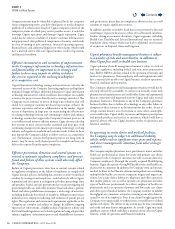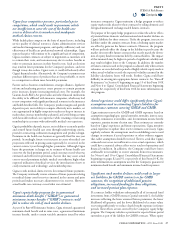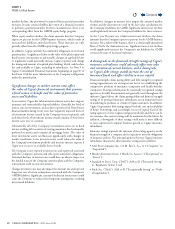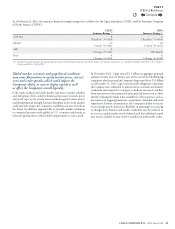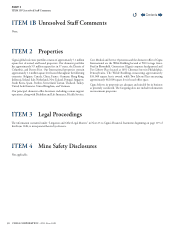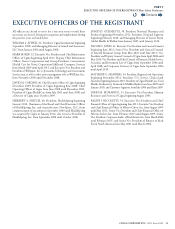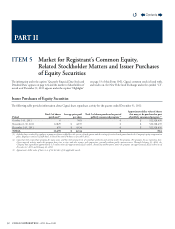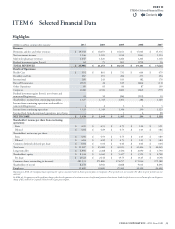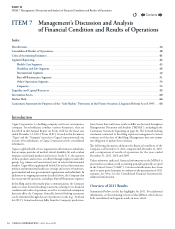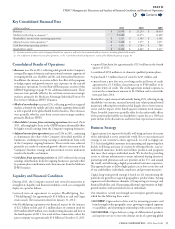Cigna 2011 Annual Report Download - page 47
Download and view the complete annual report
Please find page 47 of the 2011 Cigna annual report below. You can navigate through the pages in the report by either clicking on the pages listed below, or by using the keyword search tool below to find specific information within the annual report.
25CIGNA CORPORATION2011 Form10K
PARTI
ITEM 1A Risk Factors
limited control over their actions. Noncompliance with any privacy or
security laws and regulations or any security breach involving one of its
third-party service providers could have a material adverse eect on its
business, results of operations, nancial condition and reputation. In
addition, to the extent Cigna outsources selected services or selected
functions to third parties in foreign jurisdictions, the Company
could be exposed to risks inherent in conducting business outside
of the UnitedStates, including international economic and political
conditions, additional costs associated with complying with foreign
laws and uctuations in currency values.
e expanding role of third party providers may also require changes
to Cigna’s existing operations and the adoption of new procedures
and processes for retaining and managing these providers, as well as
redistributing responsibilities as needed, in order to realize the potential
productivity and operational eciencies. Eective management,
development and implementation of its outsourcing strategies are
important to Cigna’s business and strategy. If there are delays or
diculties in enhancing business processes or its third party providers
do not perform as anticipated, Cigna may not fully realize on a timely
basis the anticipated economic and other benets of the outsourcing
projects or other relationships it enters into with key vendors, which
could result in substantial costs or regulatory compliance issues, divert
management’s attention from other strategic activities, negatively aect
employee morale or create other operational or nancial problems
for the Company. Terminating or transitioning arrangements with
key vendors could result in additional costs and a risk of operational
delays, potential errors and possible control issues as a result of the
termination or during the transition phase.
Acquisitions, including HealthSpring, involve risks,
and the Company may not realize the expected benefits
because of integration difficulties, underperformance
relative to Cigna’s expectations and other challenges.
As part of the Company’s growth strategy, Cigna regularly considers
strategic transactions, including acquisitions, with the expectation
that these transactions will result in various benets. Cigna’s ability to
achieve the anticipated benets of acquisitions is subject to a number
of uncertainties, including whether Cigna integrates its acquired
companies in an ecient and eective manner, the performance of the
acquired businesses and general competitive factors in the marketplace.
Failure to achieve these anticipated benets could result in increased
costs, decreases in expected revenues, goodwill impairment charges,
and diversion of management’s time and energy.
Most recently, in January2012, Cigna acquired HealthSpring, an operator
of Medicare Advantage coordinated care plans in 11 states and the District
of Columbia. e success of the HealthSpring acquisition will depend
on Cigna’s ability to integrate HealthSpring with its existing businesses
and the performance of the acquired business. e integration process
may be complex, costly and time-consuming. e potential diculties
of integrating the operations of HealthSpring include: implementing the
Company’s business plan for the combined business; executing Cigna’s
growth plans by leveraging its capabilities and those of the businesses
being acquired in serving the Seniors segment; unanticipated issues in
integrating logistics, information, communications and other systems;
changes in applicable laws and regulations or conditions imposed
by regulators; retaining key employees; operating risks inherent in
HealthSpring’s business and Cigna’s business; retaining and growing
membership; renewing or successfully rebidding for contracts with
CMS, leveraging the information technology platform of the acquired
businesses; and unanticipated issues, costs, obligations and liabilities. If
Cigna is unable to integrate the HealthSpring business successfully, or
if the acquired business underperforms, it could have a material adverse
eect on Cigna’s business, results of operations and nancial condition.
Eective internal controls are necessary for the Company to provide
reliable and accurate nancial reports and to mitigate the risk of fraud.
e integration of acquired businesses is likely to result in Cigna’s
systems and controls becoming increasingly complex and more dicult
to manage. Any diculties in the assimilation of acquired businesses
into the Company’s control system could cause it to fail to meet its
nancial reporting obligations. Ineective internal controls could also
cause investors to lose condence in the Company’s reported nancial
information, which could have a negative eect on the trading price
of Cigna’s stock and its access to capital.
Cigna’s business depends on its ability to properly
maintain the integrity of its data and the uninterrupted
operation of its systems and business functions,
including information technology and other business
systems.
Cigna’s business depends on eective information systems and
the integrity and timeliness of the data it uses to run its business.
Cigna’s business strategy requires providing customers and health care
professionals with Internet-enabled products and information to meet
their needs. Cigna’s ability to adequately price its products and services,
establish reserves, provide eective and ecient service to its customers,
and to timely and accurately report its nancial results also depends
signicantly on the integrity of the data in its information systems. If
the information Cigna relies upon to run its businesses were found to be
inaccurate or unreliable due to fraud or other error, or if Cigna (or the
third-party service parties it utilizes) were to fail to maintain information
systems and data integrity eectively, the Company could experience
diculties with, among other things: operational disruptions (which
may impact customers and health care professionals); determining
medical cost estimates and establishing appropriate pricing; retaining
and attracting customers; and regulatory compliance.
In addition, Cigna’s business is highly dependent upon its ability to
perform, in an ecient and uninterrupted fashion, its necessary business
functions, such as: claims processing and payment; internet support and
customer call centers; and the processing of new and renewal business.
Failure to comply with relevant regulations, a power outage, pandemic,
or failure of one or more of information technology, telecommunications
or other systems could cause slower system response times resulting in
claims not being processed as quickly as clients desire, decreased levels
of client service and client satisfaction, and harm to Cigna’s reputation.
Because Cigna’s information technology and telecommunications
systems interface with and depend on third-party systems, Cigna could
experience service denials if demand for such service exceeds capacity
or a third-party system fails or experiences an interruption. If sustained
or repeated, such a business interruption, systems failure or service
denial could result in a deterioration of Cigna’s ability to pay claims
in a timely manner, provide customer service, write and process new
and renewal business, or perform other necessary corporate functions,
and could have a material adverse eect on Cigna’s business, results of
operations and nancial condition.
Contents
Q


